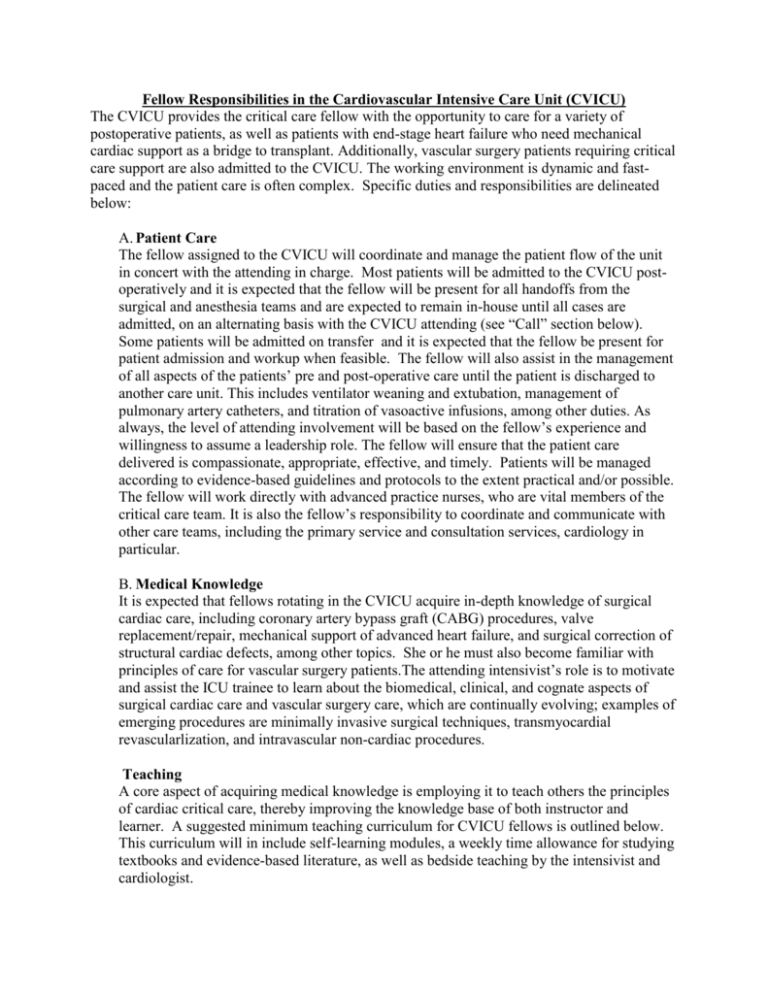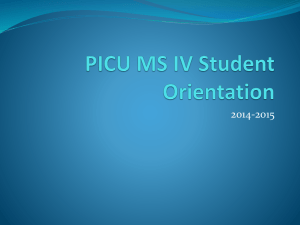CVICU
advertisement

Fellow Responsibilities in the Cardiovascular Intensive Care Unit (CVICU) The CVICU provides the critical care fellow with the opportunity to care for a variety of postoperative patients, as well as patients with end-stage heart failure who need mechanical cardiac support as a bridge to transplant. Additionally, vascular surgery patients requiring critical care support are also admitted to the CVICU. The working environment is dynamic and fastpaced and the patient care is often complex. Specific duties and responsibilities are delineated below: A. Patient Care The fellow assigned to the CVICU will coordinate and manage the patient flow of the unit in concert with the attending in charge. Most patients will be admitted to the CVICU postoperatively and it is expected that the fellow will be present for all handoffs from the surgical and anesthesia teams and are expected to remain in-house until all cases are admitted, on an alternating basis with the CVICU attending (see “Call” section below). Some patients will be admitted on transfer and it is expected that the fellow be present for patient admission and workup when feasible. The fellow will also assist in the management of all aspects of the patients’ pre and post-operative care until the patient is discharged to another care unit. This includes ventilator weaning and extubation, management of pulmonary artery catheters, and titration of vasoactive infusions, among other duties. As always, the level of attending involvement will be based on the fellow’s experience and willingness to assume a leadership role. The fellow will ensure that the patient care delivered is compassionate, appropriate, effective, and timely. Patients will be managed according to evidence-based guidelines and protocols to the extent practical and/or possible. The fellow will work directly with advanced practice nurses, who are vital members of the critical care team. It is also the fellow’s responsibility to coordinate and communicate with other care teams, including the primary service and consultation services, cardiology in particular. B. Medical Knowledge It is expected that fellows rotating in the CVICU acquire in-depth knowledge of surgical cardiac care, including coronary artery bypass graft (CABG) procedures, valve replacement/repair, mechanical support of advanced heart failure, and surgical correction of structural cardiac defects, among other topics. She or he must also become familiar with principles of care for vascular surgery patients.The attending intensivist’s role is to motivate and assist the ICU trainee to learn about the biomedical, clinical, and cognate aspects of surgical cardiac care and vascular surgery care, which are continually evolving; examples of emerging procedures are minimally invasive surgical techniques, transmyocardial revascularlization, and intravascular non-cardiac procedures. Teaching A core aspect of acquiring medical knowledge is employing it to teach others the principles of cardiac critical care, thereby improving the knowledge base of both instructor and learner. A suggested minimum teaching curriculum for CVICU fellows is outlined below. This curriculum will in include self-learning modules, a weekly time allowance for studying textbooks and evidence-based literature, as well as bedside teaching by the intensivist and cardiologist. Post-operative ventilator management Management of vasoactive infusions Interpretation of pulmonary artery catheter data Interpretation of electrocardiograms Management of temporary pacemakers Recognition and management of arrhythmias Management of post-operative hemorrhage Management of VAD's and other mechanical assist devices Postoperative pain management Recognition and management of chronic substance use and potential for withdrawal The fellow will actively participate in bedside teaching of the ACNP’s and bedside nurses on topics germane to each practitioner’s level of training. This promotes esprit de corps among members of the multidisciplinary team and improves patient care. C. Practice-based Learning and Improvement In addition to improving her or his knowledge base, the CIVCU fellow must continually strive to critically appraise her or is patient care and solicit appraisal from nursing staff, advanced practice nurses, as well as surgical and anesthesia staff. The trainee should become familiar with CVICU protocols and other safety initiatives, such as prevention of ventilator-associated pneumonia and catheter-associated blood stream infections. D. Interpersonal and Communication Skills Good communication is central to providing safe and effective patient care. The critical care fellow is responsible for interacting with all members of the critical care staff to coordinate care. Some specific communication roles are as follows: Patient Rounds The attending intensivist and fellow determine the time for morning and afternoon rounds. The fellow assigned to the CVICU is expected to pre-round (“sit down round”) with the advanced practice nurses at 0730 to formulate tentative care plans. Formal multidisciplinary rounds with the attending intesivist and the cardiology attending will begin at 0800. Afternoon rounds generally begin at 1600. During this time, the ACNP’s will present new admissions and updates on existing patients. It is expected that the CVICU fellow will actively participate in morning rounds and direct afternoon rounds. She or he is also expected to direct all rounds during the last half of the year. Patient/Family Support Establishing a warm rapport with patients and their families and integrating them into the critical care team is an essential duty for critical care trainees. Fellows are expected to meet with patients family members to discuss the daily care plan and answer questions whenever they arise. The fellow will also coordinate and lead family conferences under the supervision of the attending intensivist. E. Professionalism Fellows in the CVICU are expected to perform their duties in professional and timely manner, adhere to ethical principles, and respect the needs of the patient population, which is increasingly diverse. The need for punctuality and proper attire should go without saying. Unexcused absences will be reported to the fellowship director and may be grounds for failure to pass the rotation. F. Systems-based Practice Critical care trainees are expected to demonstrate an awareness of the larger system of healthcare in which they work and be able to call upon system resources to provide optimal patient care. Such resources include arrhythmia service, physical and occupational therapy, and respiratory care, and palliative care. G. Procedure-based Learning The fellow will supervise advanced practice nurses and other providers as appropriate during procedures at the discretion of the attending intensivist. It is expected that the fellow will supervise all procedures unless she or he has limited or no experience with the task being performed. If possible, the fellow should perform the procedures that are timesensitive in nature, those that must be done emergently, and those that may increase the risk to the patient if not preformed smoothly. Proper sterile technique MUST be used for any procedure unless the time required to do so would compromise patient care (such instances are very rare). Basic CVICU procedures include: Arterial lines (with and without ultrasound guidance) Central venous catheters. (with ultrasound guidance when indicated) Pulmonary artery catheters Transvenous pacemakers Bronchoscopy, therapeutic and diagnostic Thoracentesis Thoracostomy tube placement Endotracheal intubation H. Miscellaneous Call The CVICU fellow will share evening telephone/pager call with the attending intensivist upon request, usually on an alternating daily basis. On Mondays, the fellow is expected to stay until all cases are admitted from the O.R. and then on an alternating basis with the CVICU attending for the remainder of the week. The CVICU fellow will take two weekend calls in the month (rounding, procedures and taking first calls on either the Saturday or the Sunday of their call week-end). They must average one day off in seven during the month. Selected Reading 1. ACC/AHA Joint Guidelines. 2009; http://www.americanheart.org/presenter.jhtml?identifier=3004542. Accessed July 28, 2009. 2. 3. 4. 5. 6. 7. 8. 9. 10. 11. 12. 13. Bhatheja R, Mukherjee D. Acute coronary syndromes: unstable angina/non-ST elevation myocardial infarction. Crit Care Clin. Oct 2007;23(4):709-735, v. Cameron OG. Delirium, depression, and other psychosocial and neurobehavioral issues in cardiovascular disease. Crit Care Clin. Oct 2007;23(4):881-900, viii. Chughtai A, Kazerooni EA. CT and MRI of acute thoracic cardiovascular emergencies. Crit Care Clin. Oct 2007;23(4):835-853, vii. Crawford TC, Oral H. Cardiac arrhythmias: management of atrial fibrillation in the critically ill patient. Crit Care Clin. Oct 2007;23(4):855-872, vii. Diamond LM. Cardiopulmonary resuscitation and acute cardiovascular life support--a protocol review of the updated guidelines. Crit Care Clin. Oct 2007;23(4):873-880, vii. Ellenbogen K, Wood M. Cardiac Pacing and ICD's. 5th ed. Hoboken: Blackwell; 2008. Gurm HS, Bates ER. Cardiogenic shock complicating myocardial infarction. Crit Care Clin. Oct 2007;23(4):759-777, vi. Kamalakannan D, Rosman HS, Eagle KA. Acute aortic dissection. Crit Care Clin. Oct 2007;23(4):779-800, vi. Karve AM, Bossone E, Mehta RH. Acute ST-segment elevation myocardial infarction: critical care perspective. Crit Care Clin. Oct 2007;23(4):685-707, v. Neuenschwander JF, 2nd, Baliga RR. Acute decompensated heart failure. Crit Care Clin. Oct 2007;23(4):737-758, vi. Rubenfire M, Bayram M, Hector-Word Z. Pulmonary hypertension in the critical care setting: classification, pathophysiology, diagnosis, and management. Crit Care Clin. Oct 2007;23(4):801834, vi-vii. Sidebotham D, McKee A, Gillham M, Levy J. Cardiothoracic critical care. Philadelphia: Butterworth-Heinemann; 2007. **Note: All articles in the Critical Care Clinics can be found online at the following link: http://www.sciencedirect.com/mdc?_ob=PublicationURL&_cdi=25746&_pubType=J&_acct=C00006468 4&_version=1&_urlVersion=0&_userid=4740045&md5=137e70f05702f9f33ad9a8e055782fbc& jchunk=23#23







